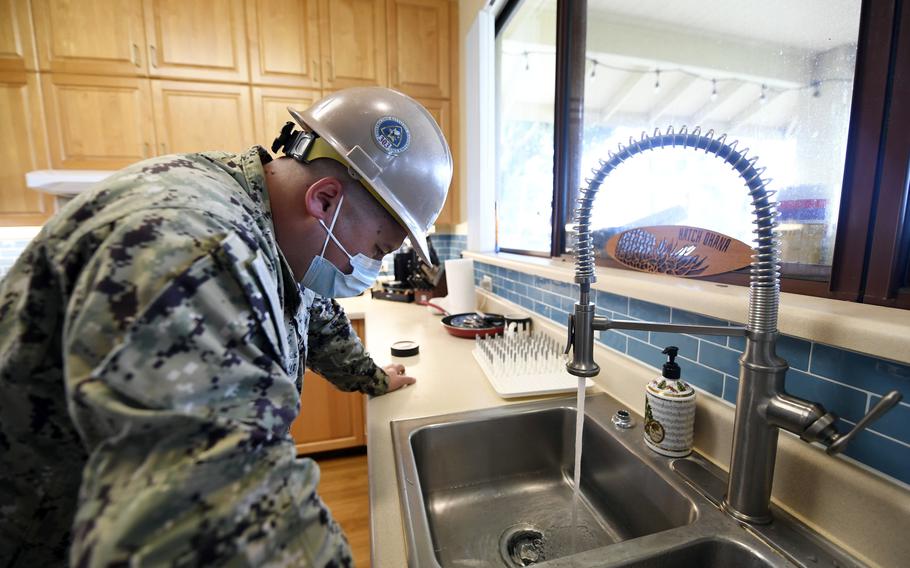
A sailor inspects running water at a home on Joint Base Pearl Harbor-Hickam, Hawaii, on Feb. 18, 2022, in response to a jet fuel spill that contaminated the area’s drinking water. (Christopher Thomas/U.S. Navy)
FORT SHAFTER, Hawaii — Defense Department civilians who received money for temporary relocation during the Red Hill water contamination disaster in Hawaii last year do not have to pay income taxes on those funds, the Internal Revenue Service said Wednesday.
The IRS in a Wednesday announcement said the U.S. Treasury Department had determined the Red Hill fuel spill is “a qualified disaster” under the Internal Revenue Code and thus the relief payments are not taxable.
Scores, even hundreds, of residents of military communities on or near Joint Base Pearl Harbor Hickam welcomed the policy reversal. Earlier this year, they were stunned by a tax bill on emergency funds they received in 2022 to pay for hotel stays, meals and personal property damage after leaving their homes.
Some residents saw their gross incomes inflated by more than $20,000, in some cases moving them into a higher tax bracket.
The unexpected tax bill outraged the affected residents, primarily federal employees, contractors and retirees who balked at paying a tax on a crisis of the Navy’s own making.
In one case, a retired Navy veteran learned she owed $6,500 in taxes on $22,000 she received from the government to temporarily relocate her family in early 2022 after jet fuel from the Navy’s Red Hill underground fuel storage facility leaked into their drinking water.
Active-duty service members who received the same relief payments were apparently exempted from the tax from the start.
In early March, Hawaii’s congressional delegation wrote to the acting commissioner of the IRS urging him to waive taxation on the Red Hill emergency funds.
Navy Secretary Carlos Del Toro approved payments for civilians on Feb. 25, 2022, under the Emergency and Extraordinary Expense authority provided for in federal statutes, the IRS said.
The Defense Department then made three types of emergency payments to affected civilians.
First were payments made to reimburse lodging and meal expenses by affected civilians who had no clean water at home and opted to temporarily relocate to hotels.
Second were reimbursements of meal expenses for civilians opting to remain in their homes even though their water was contaminated. Third were payments to reimburse the expenses of personal property damage.
The IRS advises those who have not yet filed their 2022 income tax returns to simply exclude the amount stated on the form received earlier this year from the Defense Finance and Accounting Service.
Those who have already filed returns that included the emergency funds can amend it by filing Form 1940-X.
Further details can be found in the announcement at www.irs.gov/pub/irs-drop/a-23-07.pdf.